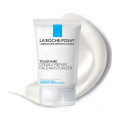17 Foods Rich in Choline: Health Benefits & Effects of Deficiency
Given the numerous benefits of foods rich in choline, no one would want to miss out on this healthy nutrient. Incorporate choline-rich foods into your daily diet for the best results.
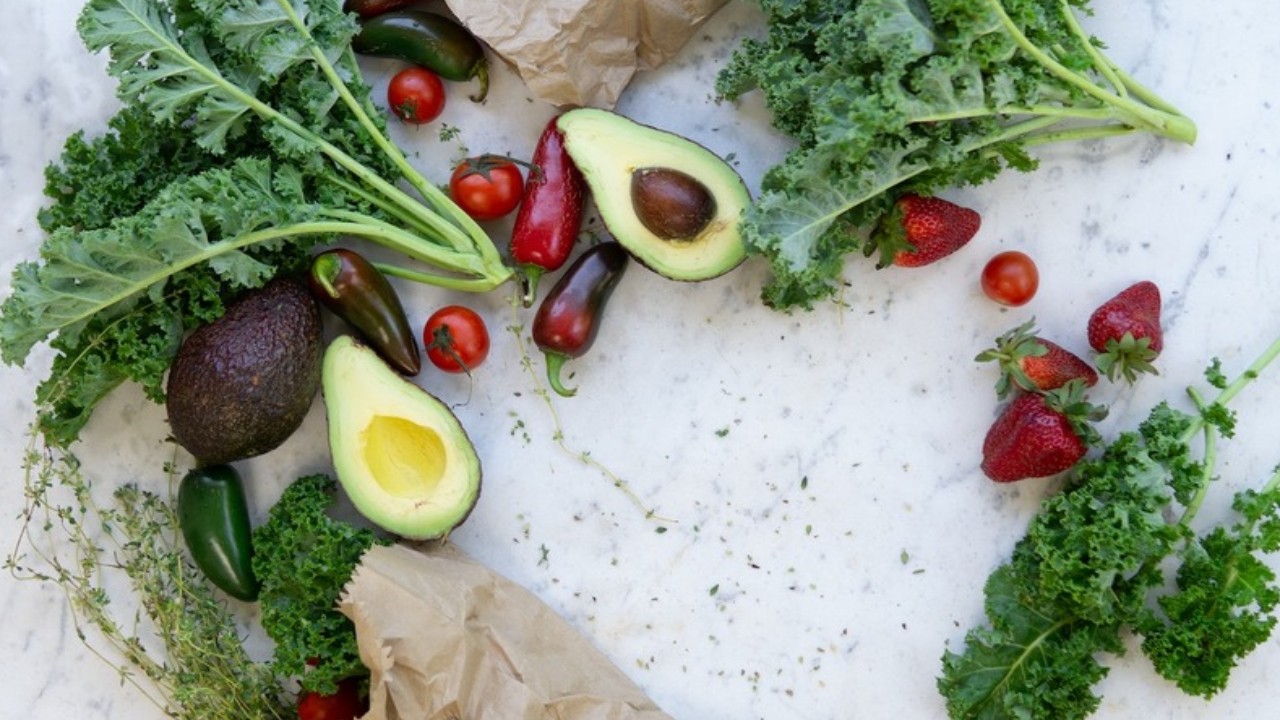
Choline is a micronutrient that has been discovered recently. Although comparatively unknown, it’s equally essential. Incorporating foods rich in choline in your diet is extremely necessary as it is surprisingly difficult to find it in most multivitamin brands. Your body produces this micronutrient, but in a limited amount. Therefore, you need to get it from your diet to avoid a deficiency.
Speaking of micronutrient deficiency, our contributor Mary Sabat, RDN, LD, and Ace Certified Trainer, says, “Micronutrient deficiencies can lead to a range of health problems and complications. Micronutrient deficiencies can impair immune function, hinder growth and development, and increase susceptibility to various diseases and health issues. So, it is recommended to derive micronutrients in a good amount to prevent deficiency.”
Many animal products and plant foods including cruciferous vegetables contain choline. All you need to do is simply include these foods in your daily diet. The primary role that choline plays in improving various bodily functions including brain health, cognitive performance, and the formation of DNA, makes it a vital micronutrient for humans.
According to Bella Carvosso, a Biomedical Scientist and Nutritionist, “Micronutrients, including vitamins and minerals, are vital for various physiological functions in the body. They play crucial roles in metabolism, immune function, and overall well-being. Despite being required in smaller quantities compared to macronutrients, their absence can lead to severe health issues. For instance, vitamin deficiencies can cause conditions like scurvy, while insufficient minerals may impair bone health. Obtaining a balanced intake of micronutrients through a diverse diet is essential for maintaining optimal health and preventing nutritional deficiencies that can compromise bodily functions.”
This article has everything you need to know about choline including the health benefits of choline and the foods rich in choline.
Digging Deep into What is Choline
Choline neither fits into the vitamin category nor the mineral one. It is a water-soluble micronutrient that is most commonly grouped into the B vitamin family due to its similarities. Despite being deemed an essential nutrient for public health in the U.S., many people lack a sufficient amount of Choline in their bodies. It has a vital role to play in proper liver function, healthy brain development, fetal development, muscle movement, nervous system, and metabolism (1).
This magical nutrient is available in the market as a supplement on its own and in combination with B-complex vitamins and multivitamins. However, its effectiveness from supplements over dietary sources is yet to be confirmed.
Why Choline Is Needed
Research suggests that the micronutrient requirement in adults varies due to various reasons. According to the Food And Nutrition Board, while adult men are required to take 550 mg of choline per day, 425 mg of choline is a must for an adult woman. Meanwhile, those who are pregnant and breastfeeding their babies need 450 mg and 550 mg of choline per day. The reason behind the increased intake for pregnant women is the role of choline in fetal growth and development (2).
Choline serves several key functions in the body. This is why adequate choline intake is a must for optimal health. Here’s a glimpse of why your body needs this wonder micronutrient and why is it important for health:
1. For the Synthesis of an Important Neurotransmitter
Choline is needed for the human body as it plays a critical role in the production of the neurotransmitter acetylcholine. Acetylcholine is an excitatory mediator that is important for regulating heart rhythm, blood pressure, and the contraction (and subsequent relaxation) of the muscles. This neurotransmitter has a majority of the functions in the nervous system, particularly in the brain which further assists memory, mood, and focus (3). Research also suggests the functions of choline to improve cognitive function and memory (4).
Bella Carvosso further says, “Neurotransmitters are crucial chemical messengers facilitating communication between nerve cells in the brain and throughout the nervous system. They transmit signals across synapses, the junctions between neurons. By binding to receptors on the receiving neuron, neurotransmitters relay signals that influence mood, cognition, and various physiological processes. Balancing excitatory and inhibitory neurotransmitters is essential for maintaining proper brain function. Imbalances can contribute to mental health disorders such as depression, anxiety, or schizophrenia. Understanding neurotransmitter roles is fundamental for comprehending neural communication and developing treatments for neurological and psychiatric conditions.”
2. Aids in the Nervous System Function
While more research is ongoing to prove the potential of choline to boost cognitive performance, preliminary studies have found that an adequate intake of choline may decrease the risk of Alzheimer’s disease and dementia. On the other hand, lack of adequate choline may cause profound changes in the brain, associated with Alzheimer's disease (5).
3. DNA Synthesis and Nutrient Formation
Choline, along with some other vitamins, helps with a process that is needed for DNA synthesis. In fact, choline deficiency results in the modification of DNA and chromosome structure that regulate gene expression (6). This micronutrient is also a key component of Vitamin B6 formation in the body, especially for folate and B12, which are crucial for healthy development and metabolism. Folate is extremely important for pregnant women as it is required for neural tube development in growing babies.
4. Helps Maintain Liver Health
Another function of choline is its requirement to excrete cholesterol from the liver. Research links choline deficiency to nonalcoholic fatty liver disease (7). The deficiency of choline may cause fat and cholesterol accumulation. On the other hand, higher intakes of choline can cause liver toxicity.
5. Metabolism
Metabolism is chemical reactions that take place in our body to change food into energy and break down nutrients to support healthy functions. Choline plays a key role in normal metabolic processes as it is responsible for breaking down fats that maintain good cell membrane structure (1). It also carries nutrients around your body.
17 Foods Rich in Choline
Simply put, Choline is essential for brain, immune, cardiovascular health, liver, metabolic, cell, and reproductive health. Both animal-based and plant-based diets contain choline. However, green vegetables and other vegetarian-friendly foods have choline in lower amounts in comparison to non-vegetarian foods. Here's a look at some of the best food sources of choline that you may consider having your diet regularly:
1. Organ Meat
Organ meat like liver and kidney is rich in several vitamins and minerals, including iron, B12, folate, vitamin A, copper, and selenium. Plus, meats are the best sources of choline. Incorporating a small amount of meat in your diet gets you enough quantity of essential nutrients like choline (8). Just 3 ounces (85 grams) of cooked beef liver boasts 240 mg which is 65% of the dietary requirement (8).
2. Fish
Fish like tuna, salmon, and haddock have been found to be a rich source of several nutrients including choline. Just three ounces of smoked salmon provides 187 mg of choline (1). Research by the Child and Family Research Institute, Canada, suggested that having an adequate amount of fish intake improves blood concentrations of vitamin D, choline, and DHA (omega-3 fatty acids) (9).
3. Whole Eggs
Eggs have high choline content, thereby making it a choline source. One large egg with yolk offers 147 mg of choline, which means 2 eggs per day cover 54% of the RDI. But, its choline content is mostly concentrated in the yolk. In Fact, 100 grams of egg yolk contains 680 mg of the nutrient while 100 grams of egg white serves only 1 mg of choline (10). Studies have also found that phospholipids in egg yolk improve choline absorption. Phospholipids in egg yolk consist of both hydrophilic and hydrophobic components which makes them easy to be absorbed by your digestive tract (11).
4. Caviar
Fish roe, or caviar, is packed with the omega-3 fatty acids eicosapentaenoic acid (EPA) and docosahexaenoic acid (DHA). Both have anti-inflammatory properties and are an excellent source of choline (12). Just 85 grams of caviar boasts 285 mg which is 52% of the RDI (13).
5. Soy
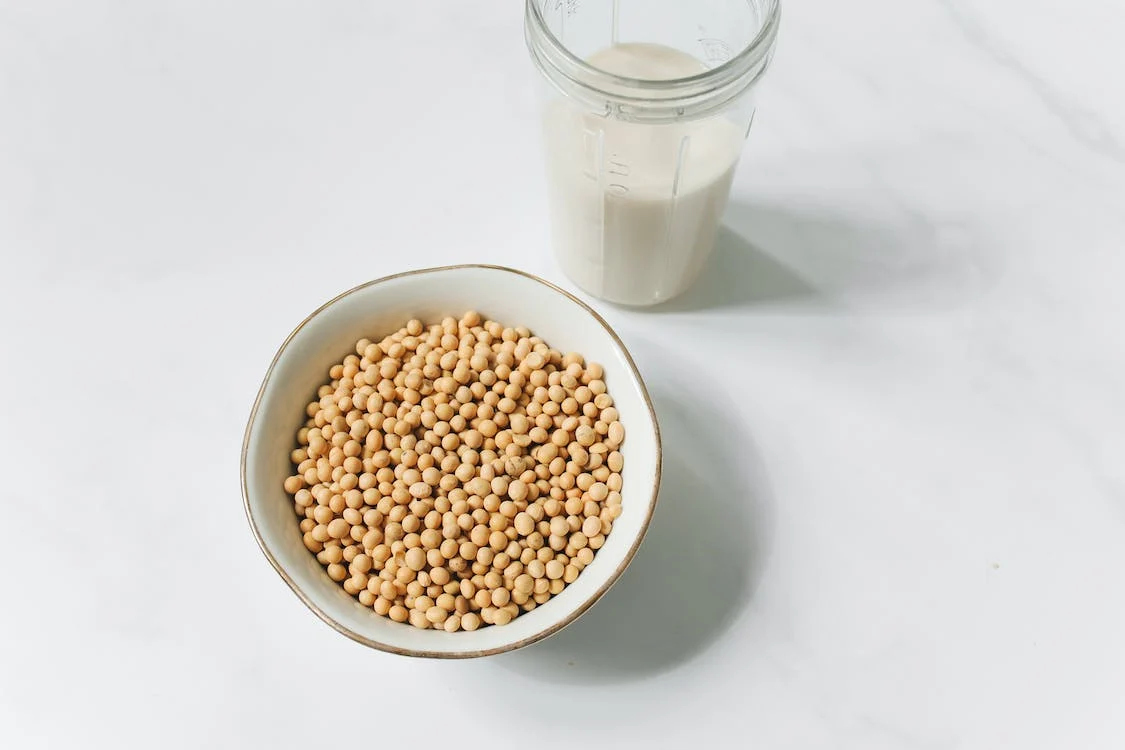
Raw soybeans also have a significant amount of choline in them. 100g of Soy contains 116 mg of choline, making it the ultimate source of choline for those relying on plant-based food for their nutrient intake (14). Soybeans also contain plant-based protein, fiber, manganese, magnesium, zinc, and folate (14). One can also consume soy products like tofu, soy milk, tempeh, and edamame.
6. Green Vegetables
Green vegetables, especially cruciferous vegetables, like broccoli and cauliflower are rich sources of choline. One cup each of chopped broccoli (91g) and chopped cauliflower (107g) and 160g) of cooked Brussels sprouts contains 17 mg, 47.4 mg, and 31.2 mg of choline, respectively (15),(16), (17).
7. Shiitake Mushrooms

Shiitake mushrooms happen to be a great source of plant-based choline. It contains a lot of nutrients like vitamin B5, selenium, and copper. These nutrients may benefit your immune health. One cup (145 grams) of cooked shiitake mushrooms serves 116 mg of choline which covers 21% of your daily needs (18).
8. Potatoes
Potatoes, too, have an impressive array of nutrients like choline. One medium potato of 173g provides 24.9 mg of choline (19). Red potatoes, on the other hand, are a delicious source of carbs and other vital nutrients like vitamin C, potassium, and choline. 1 large (299-gram) red potato has 57 mg of choline (2).
9. Cottage Cheese
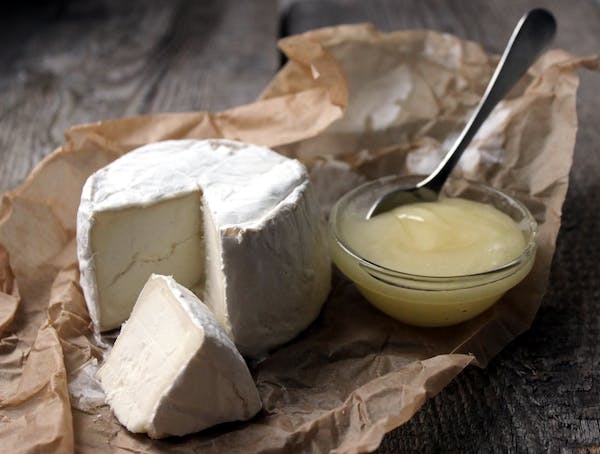
Dairy products, as per anecdotal evidence, are a good choline source. One of the dairy products with high choline content is cottage cheese, a nutritious and protein-packed food. 210 grams of plain cottage cheese contains 39 mg which equates to 7% of the RDI for choline (20). Cottage cheese is also proven to be an excellent source of calcium, selenium, riboflavin, and B12 (20). Inculcate cottage cheese into your diet and have it after topping with chopped almonds and berries for breakfast or as a snack.
10. Quinoa
Quinoa is a popular gluten-free pseudocereal. Although it’s botanically not a cereal but used as one. A good source of many nutrients, Quinoa also contains choline. It’s one cup of 185 grams provides 43 mg of the nutrient (21). Quinoa can be combined with other foods to create nutrient-rich meals. You can try a breakfast hash with eggs, broccoli, and red potatoes atop a bed of cooked quinoa for a choline-rich breakfast option.
11. Lime beans
Interestingly, studies have found that immature lima beans are one of the best sources of choline, especially for those who mostly consume vegan diets (22). A 1-cup serving of cooked immature lima beans (170 gm) offers 75 mg of choline, which is 14% of your daily needs (23).
12. Kidney beans
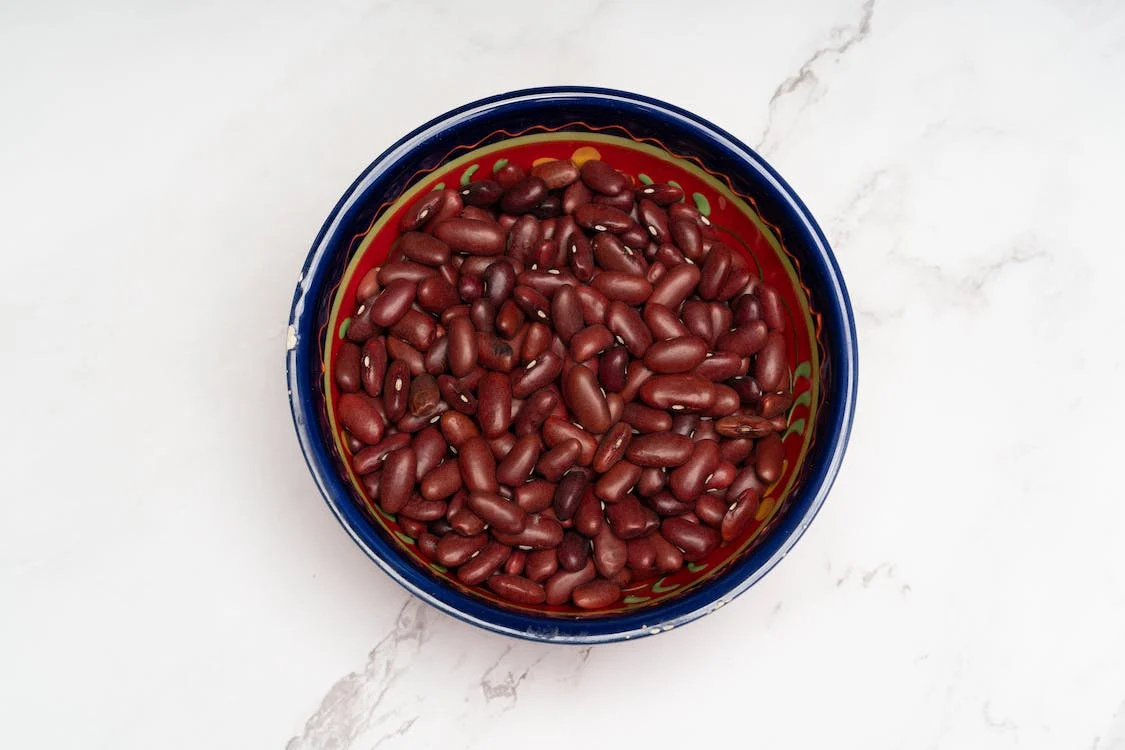
Kidney beans fall into the category of legumes and are highly nutritious. These are also a good source of choline. One cup (177 grams) of cooked kidney beans serves 54 mg of the nutrient (24).
13. Beef
Beef is popular for its rich nutrient contents including choline. 85-gram serving of cooked beef provides 115 mg which means that it covers 21% of the RDI (25). This food also contains highly bioavailable protein and iron. For those who are anemic and have few or misfunctioning red blood cells, beef consumption may help as it raises blood iron levels and maintains healthy iron stores in the human body (26).
14. Wheat Germ
Wheat germ is best known for its fiber content. However, it is also packed with many other nutrients including vitamin E, manganese, magnesium, and zinc part from being a good choline source (27). Just 3 ounces of toasted wheat germ packs 153 mg of choline or 28% of the RDI (27). To consume wheat germ and have a boost of choline, one can simply add it to oatmeal, yogurt, or smoothies.
15. Chicken and Turkey
Protein-rich foods like chicken and turkey are extremely important for your overall health. Therefore, it is needed to add these foods to your diet. Protein-rich foods may promote better blood sugar management and also provide important nutrients (28). Chicken and turkey have a sufficient amount of choline, with both offering 72 mg per 3-ounce serving (27).
16. Almonds
Almonds are associated with a number of health benefits. The research found that eating these nuts may boost levels of heart-protective HDL cholesterol. Eating almonds may also promote a healthy body composition (29). Almonds possess many nutrients including vitamin E, protein, fiber, and magnesium. Eating 1 ounce of this plant-based source of choline offers about 15 mg of the nutrient (30). Although they contain smaller amounts of choline; snacking on almonds may boost your choline intake.
17. Shrimp
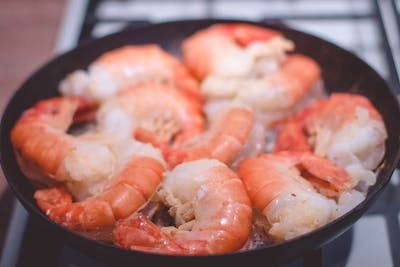
Shrimp is served with many dishes and while an individual enjoys shrimp, it is important to know that it’s also an excellent source of choline. Shrimp offers around 115 mg per three-ounce portion (31).
Check out the Essential Health Benefits of Choline
Choline has been found to play an essential role in maintaining cardiovascular health, prevention of liver disease, improvement in memory, and various other functions linked with the brain. Let us take a look at its primary health benefits:
May Improve Brain Function
Foods high in choline and choline supplements are suggested to be brain-boosting foods. One can rely on choline-rich foods if looking for memory-enhancing foods, cognitive function foods, or nerve function foods as well. This is because acetylcholine (neurotransmitter) that is produced by choline. However, loss of cholinergic neurons has been linked with impaired cognitive function like memory loss and Alzheimer’s disease. According to a review published in the American Journal of Clinical Nutrition, dietary choline intake may improve cognitive function (2). Its consumption during pregnancy may also improve fetal brain development (32).
May Support Heart Health
Choline-rich foods may reduce the risk of inflammatory conditions. Moreover, it also reduces cardiovascular disease risk (33). A study on post-menopausal women suggested that high choline intake can decrease homocysteine levels which is further associated with an increased risk of CVD (34). It may also reduce blood pressure and change lipid profiles. However, more research needs to be done for a better understanding of the association between choline intake and a reduced risk of CVD. Moreover, it needs to be understood that low betaine dietary intake can lead to incident coronary heart disease.
May Reduce Risk of Breast Cancer
One of the benefits of consuming choline-rich food is that it may help prevent the development of breast cancer in postmenopausal women. This nutrient may also help reduce breast cancer mortality (35). However, more studies are required to be done to support this claim
Lowers Risk of Liver Disease
Choline deficiency can lead to liver disease but there’s no research done to claim that its less intake will increase your risk of liver disease. A study conducted on more than 56,000 people found that women with normal weight and the highest intakes had a 28% lower risk of liver disease than those whose choline intake was lesser (36).
Effects of Choline Deficiency
Choline is a key nutrient when it comes to the maintenance of cell structure, DNA synthesis, and metabolism. A study conducted by the March of Dimes in Berkley, California, found that low dietary intake of choline in pregnant women leads to an increase in the risk of neural tube and oral cleft defects in babies (37). Not only this but choline deficiency in people has also been linked with liver and muscle dysfunction and muscle damage. which further increases the risk of non-alcoholic fatty liver disease (choline is a key player in fat transportation from the liver and this is why, its deficiency may cause fat accumulation in the liver), apoptosis. The deficiency can also increase DNA strand breaks (38). Therefore, it becomes important to ensure the intake of liver-health foods like choline-rich ingredients.
Choline: Risk Groups for Deficiency & Toxicity
Despite being one of the most essential nutrients of the human body, it has been found in several studies that the dietary choline intake of most humans is below par. Here, we have enlisted the groups that are at risk of choline deficiency.
- Endurance athletes are at an increased risk of being choline deficient. The level of the nutrient falls during long endurance exercises and the effectiveness of supplements in improving performance is doubtful (39).
- Alcohol may also result in increasing choline requirements and further your risk of deficiency (40). Hence, those consuming alcohol are at risk.
- The next category that is at risk of nutrient deficiency is postmenopausal women. This is due to the fact that estrogen helps in the production of choline in the human body. However, the production level of estrogen tends to drop in postmenopausal women (41).
- Choline requirements are high during pregnancy. This is probably because of the unborn baby’s requirement of choline for development (42).
Furthermore, here’s an insight into choline toxicity and its symptoms:
Consuming too much choline may have repercussions as its excessive intake is linked with unpleasant and harmful side effects. These side effects include lowered blood pressure, excessive sweat, fishy body odor, diarrhea, nausea, and vomiting (43).
The highest level of intake for adults is 3,500 mg per day. It is very unlikely that someone could reach this level by relying only on food and a little dose of supplements.
Talking about the ideal dosage, our contributor Mary Sabat, shares, “The recommended intake of choline can vary depending on factors such as age, sex, and life stage. However, the Adequate Intake (AI) established by the Institute of Medicine (now known as the National Academy of Medicine) in the United States is generally around 550 milligrams per day for adult men and 425 milligrams per day for adult women. Pregnant and breastfeeding women may require higher amounts, with recommendations ranging from 450 to 550 milligrams per day during pregnancy and 550 to 850 milligrams per day while breastfeeding.”
Conclusion
Choline is an essential nutrient required for optimal health as it has a huge role to play in healthy brain function, heart health, liver function, and pregnancy. Although the deficiency is rare, many people are not meeting the recommended intake of the nutrient. Fortunately, we have many animal- and plant-based foods which provide a significant amount of choline. To increase your intake, consider incorporating choline-rich foods into your diet and witness your body improving in different ways.
Contributor: Mary Sabat, RDN, LD, Ace Certified Trainer - Body Designs Ltd.





 JOIN OUR WHATSAPP CHANNEL
JOIN OUR WHATSAPP CHANNEL






































